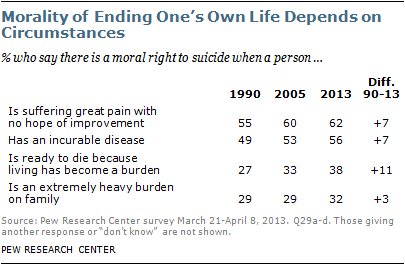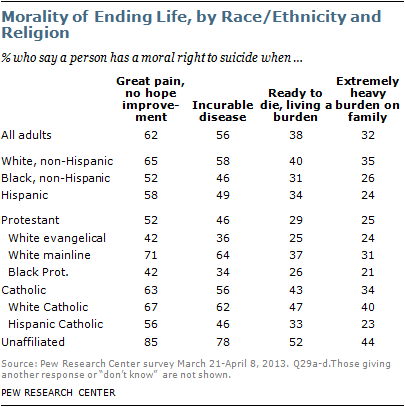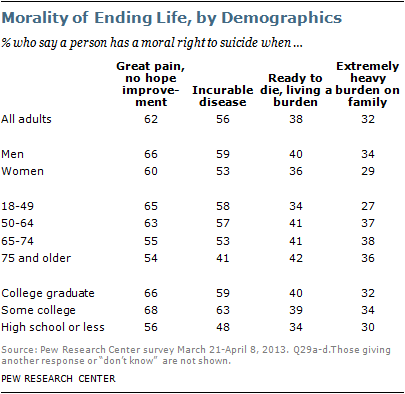
Views about physician-assisted suicide are, as expected, tied more broadly to beliefs about the morality of suicide. Such beliefs tend to vary depending on the circumstances considered. About six-in-ten adults (62%) believe a person has a moral right to end their own life if they are suffering great pain and have no hope of improvement. A majority (56%) believe a person has a moral right to end his or her life if suffering from an incurable disease. Fewer see a moral right to suicide when a person is ready to die because living has become a burden (38%) or when a person is an extremely heavy burden on his or her family (32%).
Compared with a 1990 Pew Research survey, more Americans now say that a person has a moral right to end his or her own life in three of the four circumstances considered. Belief in a moral right to suicide when a person is “ready to die because living has become a burden” has increased by 11 percentage points from 27% in 1990 to 38% today. The shares of adults who say a person is morally justified in ending his or her life because of an incurable disease or because he or she is suffering great pain with no hope of improvement each have increased by 7 percentage points since 1990. By contrast, roughly the same share of the public says suicide is morally justified when a person is an extremely heavy burden on his or her family today as said this in 1990.
The uptick in belief that suicide is morally justified under certain conditions stems mostly from an increased share of the public taking a position on these questions rather than a decline in the share saying there is no moral right to suicide. There is one exception to this pattern: Compared with 1990, there has been an increase in the share of the public that says suicide is not morally justified when a person is an extremely heavy burden on his or her family.

Beliefs about the morality of suicide tend to vary by race and ethnicity. Whites are more inclined than blacks and tend to be more inclined than Hispanics to say a person has a moral right to end his or her life under any of the four circumstances in the survey.
Attitudes on these questions are strongly related to respondents’ religious affiliation as well. For example, about half or more of white evangelical Protestants and black Protestants reject the idea of a moral right to suicide in each of the four circumstances. By contrast, the unaffiliated, followed by white mainline Protestants and white Catholics, are especially likely to say there is a moral right to suicide under each of these circumstances. In particular, about six-in-ten or more in each group believe a person is morally justified in ending his or her life if suffering from great pain with no hope of improvement or if he or she has an incurable disease.

Men and women tend to hold similar positions about the morality of suicide in the four circumstances included in the survey, although men are somewhat more inclined than women to say suicide is morally justified when a person is in great pain and has no hope of improvement (66% vs. 60%).
There are only modest differences across education groups. Those with at least some college education are more inclined than those with less schooling to say suicide is morally justified when a person is in great pain and has no hope of improvement or when a person has an incurable disease.
About half or more of all age groups consider suicide morally justified when a person is in great pain and has no hope of improvement. Americans ages 75 and older are less inclined than their younger counterparts to say suicide is morally justified when a person has an incurable disease. But adults ages 18-49 are somewhat less inclined than older Americans to believe a person has a moral right to suicide when he or she is ready to die because living has become a burden or when he or she is an extremely heavy burden on family.

Looking across this set of four questions, about half the public takes a consistent position about the morality of suicide; roughly one quarter (24%) says there is a moral right to suicide in all four circumstances, while about three-in-ten Americans (29%) say a person does not have a moral right to suicide in any of these circumstances. The remainder of U.S. adults (46%) hold views about the morality of suicide that vary depending on the circumstances, and 1% have no opinion on any of the four questions.
Compared with previous Pew Research surveys, the share of the public that consistently says there is no moral right to suicide is roughly the same as it was in 1990, while more adults consider suicide morally justified in all four cases and fewer hold views that vary depending on the circumstances.

Views about the morality of suicide tend to vary widely by religious group. About half of white evangelical Protestants (51%) and black Protestants (49%) consistently reject a moral right to suicide in each of the four conditions considered in the survey.
A majority of Hispanic Catholics (60%) and 56% of white mainline Protestants have mixed views about the moral right to suicide across this set of four circumstances.
Relative to most religious groups, the unaffiliated are more inclined to say suicide is a moral right in all four cases (37%), although about half of this group holds views about the morality of suicide that vary depending on the circumstances (53%).
Those who attend worship services at least once a week are more likely to reject the idea that suicide is morally justified. For example, half (50%) of white Catholics who attend Mass at least weekly say suicide is not a moral right in any of these four circumstances, compared with just 8% among those who attend Mass less frequently.
Views about the morality of suicide also tend to vary by race and ethnicity. Blacks are more inclined to say there is no moral right to suicide in any of these four circumstances (39%); Hispanics are more inclined to hold views that vary depending on the circumstance considered (57%).
There are few differences on this index of beliefs about suicide by gender, education or income. Adults ages 50 and older are somewhat more inclined to say there is a moral right to suicide in all four circumstances, while adults ages 18-49 hold mixed views about the morality of suicide across these four circumstances.




